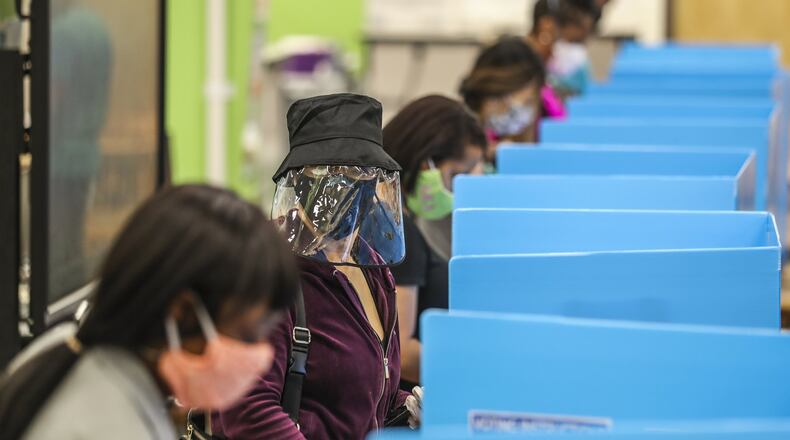How Georgians vote increasingly aligns with their political preferences, with Republicans more likely to show up in-person and Democrats preferring absentee ballots, according to a new poll by The Atlanta Journal-Constitution.
The partisan divide in voting method could result in Republicans showing larger leads from initial counts of in-person votes on election night, with Democrats catching up as more mail-in ballots are tallied in the days afterward. Election outcomes might not be known for days in close races.
About 34% of Georgia voters surveyed said they plan to vote on Election Day, according to the AJC poll of 1,150 likely voters. The poll had a 4.3-point margin of error.
With turnout expected to reach 5 million, that would amount to 1.7 million voters at polling places — twice as many as during the state’s primary that resulted in hours-long lines in some precincts.
Among voters who identified themselves as Republicans, nearly half said they’ll show up on Nov. 3. Just 19% of Democrats — amid concerns about the coronavirus — intend to vote on Election Day, with 44% saying they plan to cast absentee ballots and 33% during three weeks of early voting.
“I just feel it’s best to vote in person so your vote can’t get thrown out,” said Angela Aduri, a property manager from Grovetown. “I think the Democrats are trying to do everything they can to get (President) Donald Trump out of there.”
Others such as Patricia Smith, a school cafeteria worker in Atlanta, said she will vote absentee to avoid human contact.
“I usually vote in person, and I don’t mind standing in line,” Smith said. “I’m a diabetic, so I’m not taking that risk. There’s always long lines. This election will be something else.”
The Republican preference for Election Day voting comes after Trump has repeatedly cast suspicion on the potential for fraud with mail-in voting. In Georgia, absentee voting fraud has been rare in recent years, though Secretary of State Brad Raffensperger recently opened an investigation into about 1,000 people suspected of double-voting by casting both absentee and in-person votes.
On the other side of the political spectrum, Democrats have been pushing absentee voting as a way to get votes in and avoid the possibility that voters would stay home rather than stand in line.
The difference in behavior is already showing up among the 1.2 million voters who have requested absentee ballots so far.
Of voters who cast partisan ballots in this year’s primary and have requested an absentee ballot for the general election, 61% used Democratic Party ballots in the primary and 39% pulled Republican Party ballots, according to an AJC analysis of election data.
During the primary, each party’s voters cast absentee ballots at about the same rate, 49%.
Stephanie Peltonen, a recently retired Democratic Party voter in Midtown Atlanta, said she will vote in advance when early voting begins Oct. 12.
She waited in line for over four hours during the primary at the packed Piedmont Park precinct, and she wanted to find a way to still vote in person.
“We can still vote in person but not have to wait like that,” Peltonen said. “I’m all for mail-in, but I don’t know, there’s something about doing it yourself, being there with the other people voting.”
Roberta Shambaugh, a retired Social Security employee and Republican Party voter from Sandy Springs, said she wants to make sure her vote counts on Election Day.
“I think it’s going to be a long line, but that’s very encouraging. People still think it makes a difference,” Shambaugh said.
Raffensperger is encouraging voters to get their votes in advance of Election Day, either during in-person early voting or by absentee ballot. His office hopes that at least 60% of voters participate in advance of Nov. 3.
If one-third of voters come out on Election Day, that would be fewer voters at in-person precincts than in prior elections, including this year’s primary. About 42% of voters cast ballots on Election Day in 2016, and 37% voted on June 9 in this year’s primary.
No matter their political parties, most voters surveyed said they believe the election will be conducted with integrity. About 66% said they were either very confident or somewhat confident the election will be fair and accurate.
Slightly more Democrats than Republicans were confident in the fairness of the election, 66% to 62%.
Voting preference in Georgia
Democrats: 44% absentee, 33% early, 19% Election Day
Republicans: 10% absentee, 40% early, 48% Election Day
Source: AJC poll of likely voters
About the Author
Keep Reading
The Latest
Featured



